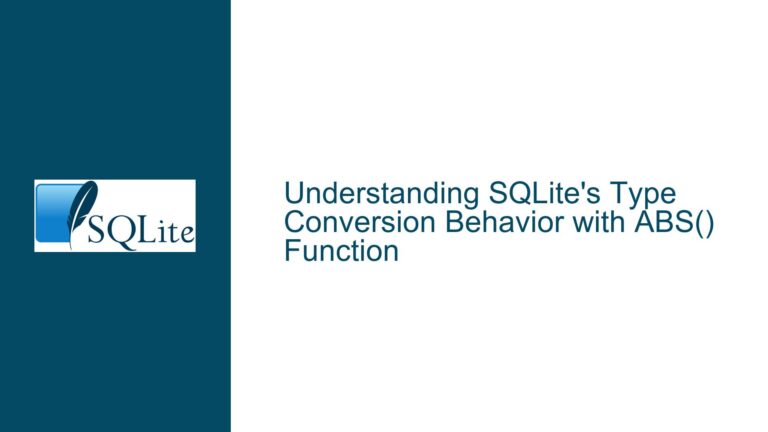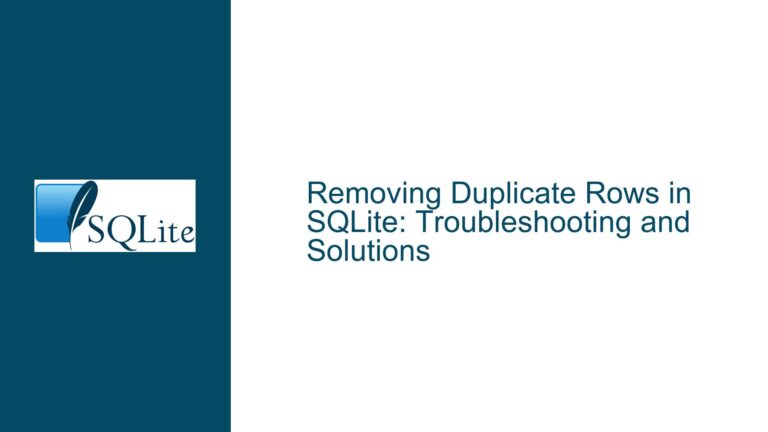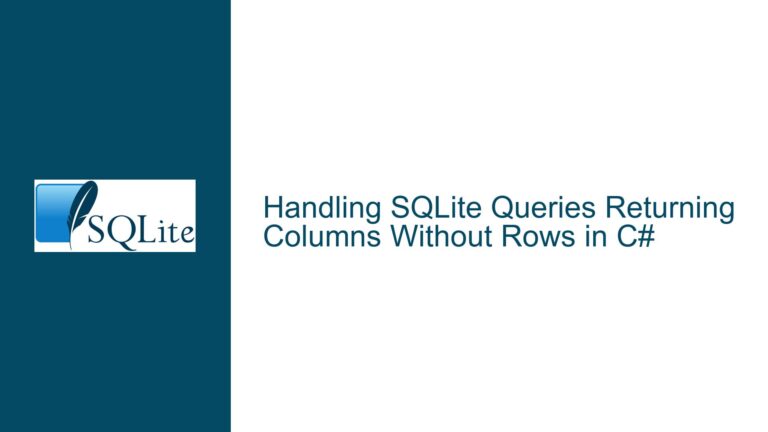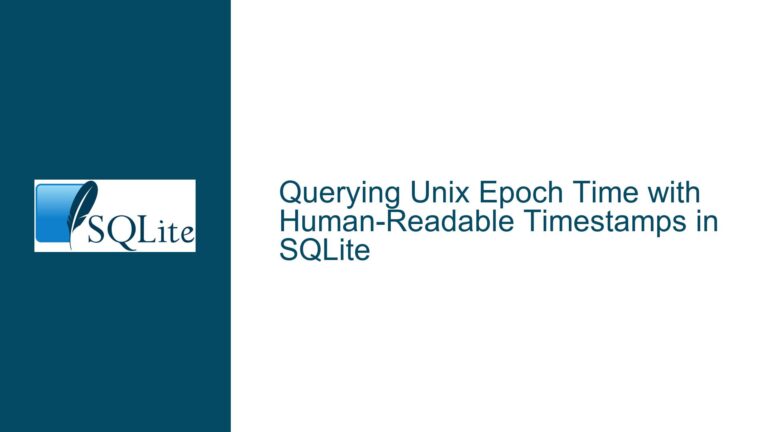Case Insensitivity and COALESCE in SQLite Queries
Issue Overview: Case Insensitivity and COALESCE Function in SQLite
In SQLite, the COALESCE function is commonly used to return the first non-null value among its arguments. However, when combined with case-insensitive columns and the DISTINCT clause, unexpected behavior can arise. Specifically, the DISTINCT clause may fail to deduplicate values when COALESCE is used, even if the columns involved are defined with a case-insensitive collation (COLLATE NOCASE). This issue stems from the way SQLite handles collation sequences in expressions versus column definitions.
Consider a table apps with columns appname, email, and alt_email, all defined with the COLLATE NOCASE attribute. When querying SELECT DISTINCT email FROM apps;, the result correctly deduplicates case-insensitive variations of the same email address. However, when using SELECT DISTINCT COALESCE(email, alt_email) FROM apps;, the query returns multiple rows with case variations of the same email address, despite the COLLATE NOCASE attribute on the columns.
This behavior occurs because the COALESCE function generates an expression that does not inherit the collation sequence of its input columns. By default, expressions in SQLite use the binary collation sequence, which treats strings as case-sensitive. As a result, the DISTINCT clause operates on the binary representation of the expression’s output, leading to case-sensitive deduplication.
Possible Causes: Collation Sequence Mismatch in Expressions
The root cause of this issue lies in how SQLite handles collation sequences for expressions versus column definitions. When a column is defined with a specific collation sequence (e.g., COLLATE NOCASE), that collation is applied to all operations involving the column, including comparisons and sorting. However, when an expression is formed using functions like COALESCE, the resulting expression does not automatically inherit the collation sequence of its input columns. Instead, it defaults to the binary collation sequence, which treats strings as case-sensitive.
In the example provided, the COALESCE(email, alt_email) expression generates a new value for each row, but this value is not associated with the COLLATE NOCASE attribute. Consequently, the DISTINCT clause operates on the binary representation of these values, leading to case-sensitive deduplication. This explains why [email protected] and [email protected] are treated as distinct values, even though the underlying columns are defined as case-insensitive.
Another factor contributing to this behavior is SQLite’s type affinity system. Columns in SQLite have an affinity that influences how values are stored and compared. However, expressions like COALESCE(email, alt_email) do not have an affinity or a predefined collation sequence. This lack of affinity and collation inheritance means that the expression’s output is treated as a raw string with binary collation, unless explicitly overridden.
Troubleshooting Steps, Solutions & Fixes: Applying Collation to Expressions
To resolve this issue, you must explicitly apply the desired collation sequence to the expression generated by COALESCE. This ensures that the DISTINCT clause operates on the case-insensitive representation of the values, rather than their binary form. The solution involves using the COLLATE keyword directly within the query to specify the collation sequence for the expression.
For example, the query SELECT DISTINCT COALESCE(email, alt_email) COLLATE NOCASE FROM apps; explicitly applies the NOCASE collation sequence to the output of the COALESCE function. This ensures that the DISTINCT clause treats [email protected] and [email protected] as the same value, resulting in the expected deduplication.
Here’s a step-by-step breakdown of the solution:
Identify the Expression Requiring Collation: In the query
SELECT DISTINCT COALESCE(email, alt_email) FROM apps;, the expressionCOALESCE(email, alt_email)is the source of the issue. This expression does not inherit theCOLLATE NOCASEattribute from theemailandalt_emailcolumns.Apply the Desired Collation Sequence: Use the
COLLATEkeyword to explicitly specify the collation sequence for the expression. For case-insensitive deduplication, applyCOLLATE NOCASEto theCOALESCEexpression. The modified query becomesSELECT DISTINCT COALESCE(email, alt_email) COLLATE NOCASE FROM apps;.Verify the Results: Execute the modified query and confirm that the
DISTINCTclause now correctly deduplicates case-insensitive variations of the email addresses. In the example, the query should return only one row with the value[email protected], regardless of case variations in the input data.Considerations for Complex Queries: If your query involves multiple expressions or nested functions, ensure that the appropriate collation sequence is applied to each relevant expression. For instance, if you use
COALESCEwithin a larger expression or subquery, applyCOLLATE NOCASEto the outermost expression to maintain consistency.Performance Implications: Applying collation sequences to expressions can impact query performance, especially for large datasets. The
NOCASEcollation requires additional processing to normalize string comparisons, which may slow down queries. If performance becomes a concern, consider optimizing the query or indexing the relevant columns with the appropriate collation sequence.Alternative Approaches: If explicitly applying collation sequences to expressions is not feasible, consider restructuring the query or schema to avoid the issue. For example, you could normalize the email addresses to a consistent case before inserting them into the database, ensuring that all comparisons are inherently case-insensitive. Alternatively, you could create a view that applies the necessary collation sequences, simplifying queries that rely on case-insensitive deduplication.
By understanding the nuances of collation sequences in SQLite and applying the appropriate fixes, you can ensure that queries involving COALESCE and DISTINCT behave as expected, even with case-insensitive columns. This approach not only resolves the immediate issue but also reinforces best practices for handling collation and expressions in SQLite.






